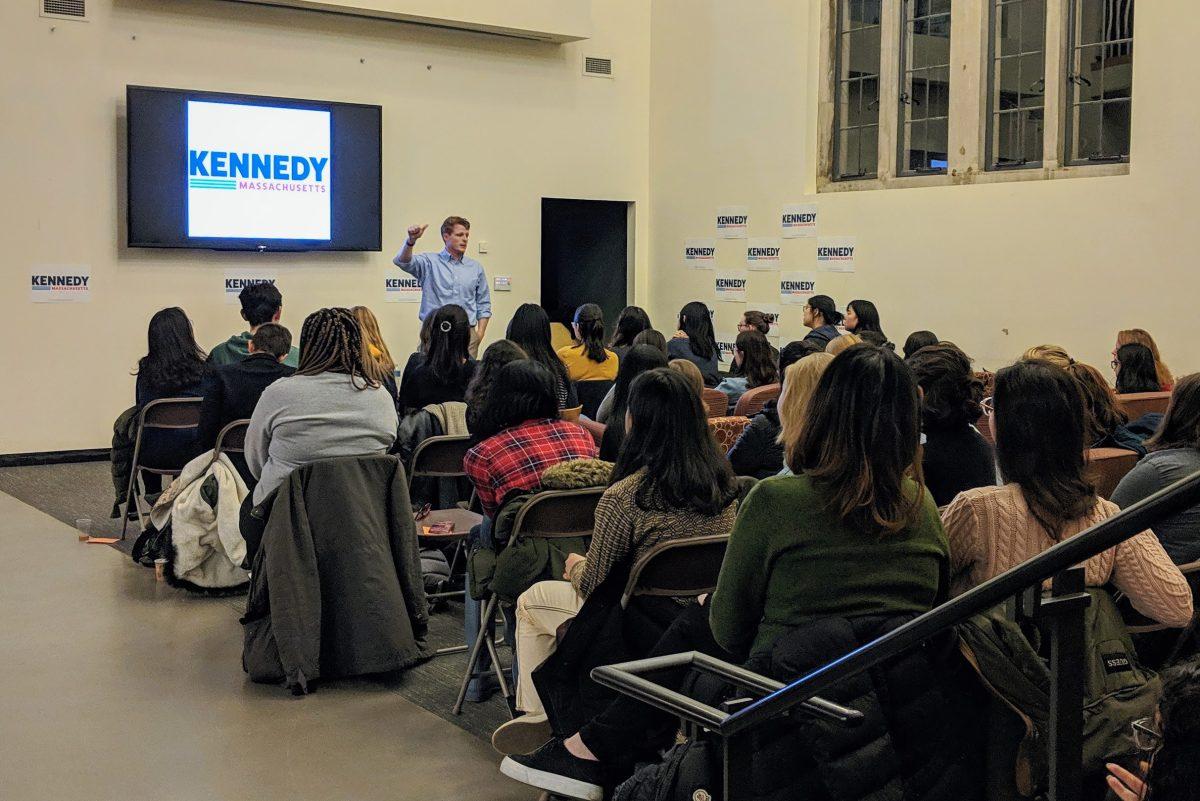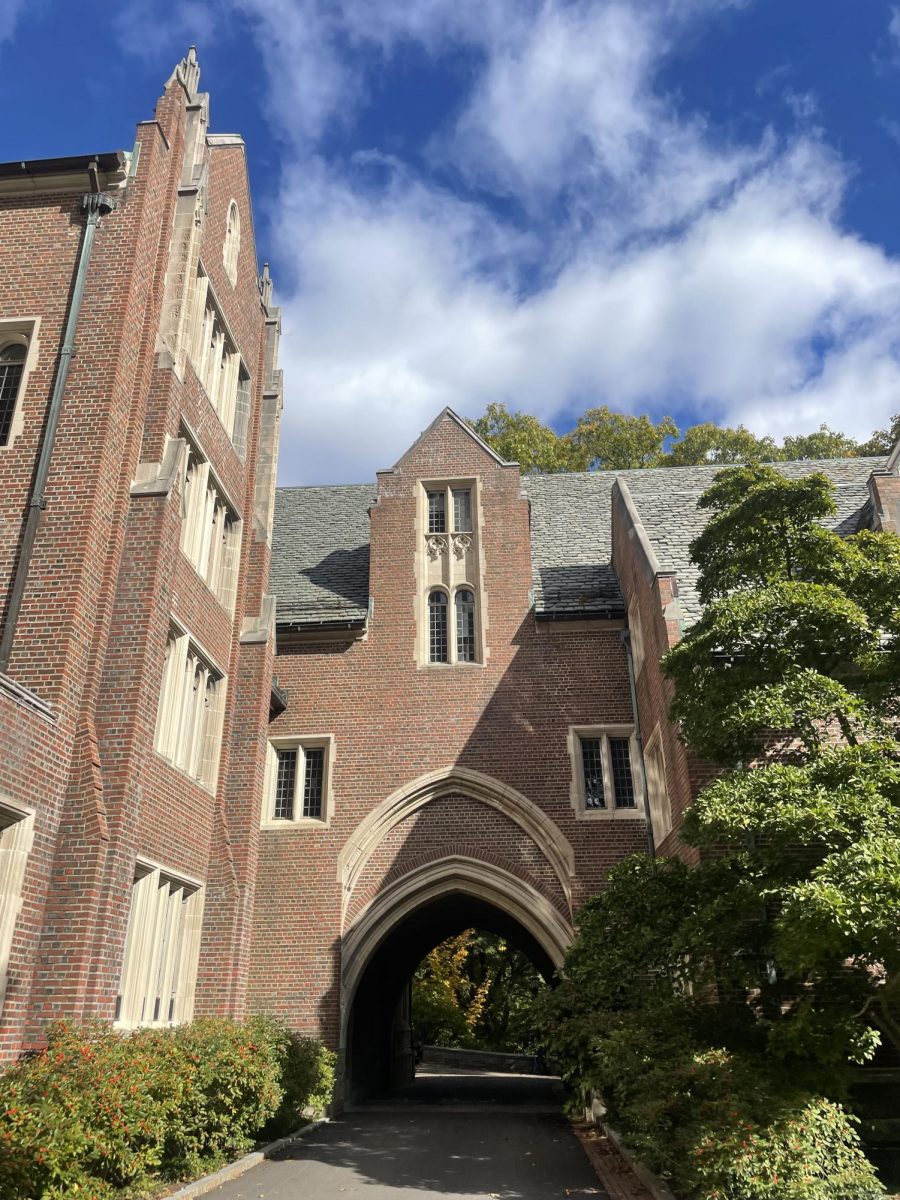On Nov. 16, Congressman Joe Kennedy made a stop at Wellesley College for an hour long conversation hosted by the Wellesley College Democrats while campaigning for his 2020 U.S. Senate race. Kennedy, a member of the storied political family, has represented the 4th congressional district of Massachusetts, which includes Wellesley College, since 2012. The Congressman has a long history of visiting Wellesley, and, as he noted during the conversation, loves hiring alumnae.
On Sept. 21, Kennedy formally announced the launch of his 2020 Senate campaign, running against incumbent Senator Ed Markey, who has served as the junior U.S. Senator from Massachusetts under presidential candidate Elizabeth Warren since 2013, and Shannon Liss-Riordan, a labor attorney.
During his most recent stop at Wellesley, Kennedy asked students which national issues they were most concerned with as 2020 approaches. A few of the issues Wellesley students raised included health care, climate change, gun control and student loans. Kennedy discussed his stances on these issues and also answered a few of the Wellesley News’ questions about his policies.
Many recent Democratic primary races have been positioned as progressive versus establishment races, best exemplified by New York Congresswoman Alexandria Ocasio-Cortez’s defeat of incumbent Rep. Joe Crowley in 2018. When asked whether he sees himself as progressive or establishment, however, Kennedy said, “That’s not what this race is.”
“I think this isn’t so much a referendum on policy positions — Senator Markey and I have an awful lot of things in common — it’s about how you would actually approach the role of a United States Senator…it’s about leveraging the platform that comes with being a Senator from Massachusetts,” Kennedy said.
Last week, Kennedy was criticized for not attending a proposed climate debate between the Democratic primary candidates that would be the first-ever senatorial climate debate. Markey, one of the co-authors of the Green New Deal, has a strong record on climate and proposed the debate. Kennedy declined the invitation, citing scheduling concerns. “There’s a formal process where campaigns sit down at a table and try to hash those out. That’s not what happened with this one,” Kennedy said.
“We have proposed more debates in any other campaign in modern history, senate campaign across Massachusetts, we’ve proposed a climate debate, and we’re waiting for Senator Markey’s team and Ms. Liss-Riordan’s team to agree on that same framework,” he continued.
In an interview with The Wellesley News, Kennedy clarified a number of his policy positions. During the open discussion, Kennedy emphasized his desire to lift up the marginalized and build stronger and more secure social safety nets, and noted that he supports wealth taxation. When asked if he would support a Sanders wealth tax plan, Kennedy admitted that he had not read the plan, which features more and higher tax brackets that begin at a lower threshold than any other Presidential candidate’s. Kennedy stated support for Elizabeth Warren’s plan, the “two-cent tax,” which proposes a two percent tax on the 75,000 wealthiest families in the U.S.
“Look, I think our government needs to take in more revenue in order to address the structural inequities that we’ve seen… There might be some other ones out there, Kennedy explained. “In order to mke the investments that are needed, when it comes to early childcare, when it comes to investments in infrastructure, when it comes to ensuring that we address the generational equity that comes with putting 1.6 trillion dollars of student loan debt on a younger generation…all of those things and more can be addressed with the revenues based off a wealth tax.”
Regarding immigration reform, Kennedy, halfway through a question about a pathway to citizenship for DACA recipients, responded: “Yes. 100 percent.”
He also answered a question about abolishing Immigration and Customs Enforcement (ICE) The agency, which falls under the jurisdiction of the Department of Homeland Security (DHS), has been criticized for its role in the implementation of the Trump administration’s anti-immigrant policies and directives. Lawmakers, including Congresswoman Alexandria Ocasio-Cortez and presidential candidate Bernie Sanders, have called for its abolition.
Kennedy said he supports reforming ICE, but he is unsure whether abolishing ICE would be the way to do so.
“You have to be sure — I come at this from a public safety perspective — if we abolish ICE and leave no federal law, federal authority in charge of enforcing immigration law, that means local authorities have to,” Kennedy said.
He noted that this may lead to mistreatment of undocumented immigrants by local law enforcement.
“So I think it’s critically important to separate those authorities out to make sure that federal authorities are in charge of enforcing federal law, and state authorities are in charge of the basic protections that you see across the country. If we abolish ICE and there’s another agency that can pick that up, fine. But I think that if you just, by abolishing ICE, you leave those responsibilities to local law enforcement, I think that creates a whole other series of challenges,” Kennedy concluded.
The primary election is Sept. 15, 2020, and the general election is Election Tuesday, Nov. 3, 2020.









